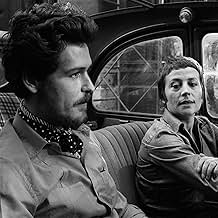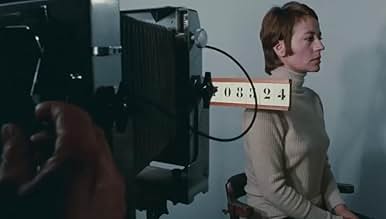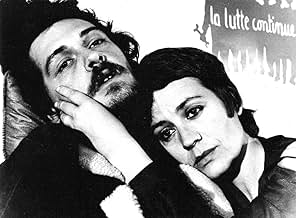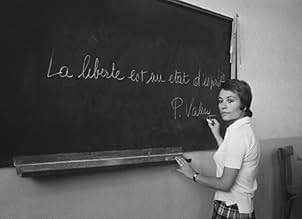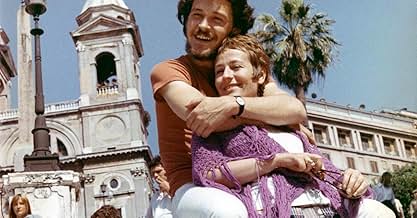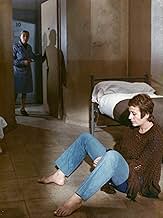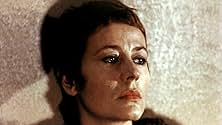Mourir d'aimer...
- 1971
- Tous publics
- 1h 50m
IMDb RATING
6.9/10
694
YOUR RATING
Rouen, France, 1968: Danièle is an unconventional French teacher. Every morning she takes her pupil Gérard to school. He flirts with her and she reciprocates his affection. This brings the p... Read allRouen, France, 1968: Danièle is an unconventional French teacher. Every morning she takes her pupil Gérard to school. He flirts with her and she reciprocates his affection. This brings the parents and the school authorities onto the scene.Rouen, France, 1968: Danièle is an unconventional French teacher. Every morning she takes her pupil Gérard to school. He flirts with her and she reciprocates his affection. This brings the parents and the school authorities onto the scene.
- Director
- Writers
- Stars
- Awards
- 2 nominations total
Marcelle Ranson-Hervé
- Madame Jaias - la voisine
- (as Marcelle Ranson)
Marianik Revillon
- Cécile
- (as Mariannik Revillon)
- Director
- Writers
- All cast & crew
- Production, box office & more at IMDbPro
Featured reviews
The kind of role in which the talented, unique Annie Girardot was an expert. A film, like many others, that could not run on Romanian screens before 1989, but about which, like about many others, they wrote in the Cinema magazine led by Ecaterina Oproiu. That, in order to understand a little bit how perverse the communist regime was in that period in Romania, where I lived then: they banned a movie about a society that banned love. The film it's kind of a modern Romeo and Juliet, a little bit different. Made after a real event in France. One of the best roles played by Annie Girardot.
Note that a number of female American high school teachers have been sent to jail for what we are asked to view as a touching love story here. And in fact so many French viewers seem to regard it. For many American viewers, I think it will be hard, today, to view it with such equanamity, even if the (legally) victim here looks beyond his years (and apparently did in the real life case). But then I've met several girls from thirteen to fifteen who looked to be twenty - try making a film about a male teacher having an affair with one of THEM. Basically, if you want to understand why so many French intellectuals think Polanski's rape of a thirteen year old was no big deal, this film will give you some insight. Beyond that, it's a very dry style of filmmmaking, where the strongest passion on all sides seems to be anger. Supposedly these two can't keep away from each other, but there is zero sensuality in their interactions; they seem far more interested in talking about their persecuters than in each other's bodies (meanwhile, one lesbian scene makes it clear the filmmaker is not shy about naked bodies). It's also surprising to suddenly see the teacher concerned about losing custody of her children, whom we never see until late in the film and who don't seem in the least to concern her until legal stirrings raise the issue. When her ex-husband suddenly appears, it is downright jarring. Emotionally, the most powerful moments are with others, not between the two protaganists. Which is to say even if I didn't have moral reservations about the whole premise, I think I'd have trouble caring very much about the main character.
A forbiden love story between a Literature teacher and her minor student. And more. The film remains a manifesto about social perspectives , prejudices, image of the other, hypocrisy and Mai 1968. And, after ahalf of century, it is a realistic portrait o today.
Sure, being myself teacher, I am very subjective about theme. I admire the beautiful acting of Annie Girardot and wise way to explore his character of Bruno Pradal. An impressive story, a real case and way to influence the lives of other based by deep selfishness and large forms of hipocrisy.
Sure, being myself teacher, I am very subjective about theme. I admire the beautiful acting of Annie Girardot and wise way to explore his character of Bruno Pradal. An impressive story, a real case and way to influence the lives of other based by deep selfishness and large forms of hipocrisy.
It is a so poignant, gripping movie, this film that can evoke SUMMER OF 43, but from another angle, told in a different manner. Here, the huge surprise is that it is question of a case of an embezzlement of a minor, involving a thirty-forty years old woman being in love with a young man; it is usually the contrary !!! I have never seen such a case before. The relationship between a mature woman and a young man under age. We can compare and analyze the differents and elements in common. Andre Cayatte was the best director for this tale, a social depiction of the 1968 France, the atmosphere, spirit, soul of this period that changed so many things in the world. Powerful performances that we can't deny. I am afraid that many people forgot this film. Such a shame. I guess that's the film that made Annie Girardot this so terrific for several generations. But a very sad story too.
Immediate background:During the events of May 1968,Gabrielle Russier , a lit teacher ,fell in love with one of her students .His parents brought proceedings against her and she ended up in jail on a corruption of a minor charge.Out of despair,she committed suicide."L'affaire Gabrielle Russier "in the late sixties became a much debated subject :even such politicians as the late Georges Pompidou referred to it.
Enter André Cayatte ....
who was championing any cause going:from euthanasia to miscarriages of justice to death penalty .Gabrielle Russier's story was tailor made for him.And Annie Girardot was the ideal actress.
Girardot agreed and the movie was made.She was very convincing and managed to transcend Cayatte's academic direction.Charles Aznavour sang the title song.
Enter André Cayatte ....
who was championing any cause going:from euthanasia to miscarriages of justice to death penalty .Gabrielle Russier's story was tailor made for him.And Annie Girardot was the ideal actress.
Girardot agreed and the movie was made.She was very convincing and managed to transcend Cayatte's academic direction.Charles Aznavour sang the title song.
Did you know
- TriviaContrary to popular belief, Aznavour's song is not in the soundtrack of the movie.
- ConnectionsFeatured in Legendy mirovogo kino: Annie Girardot
Details
- Release date
- Countries of origin
- Official sites
- Language
- Also known as
- Umreti od ljubavi
- Filming locations
- Rouen, Seine-Maritime, France(location)
- Production companies
- See more company credits at IMDbPro
Contribute to this page
Suggest an edit or add missing content


